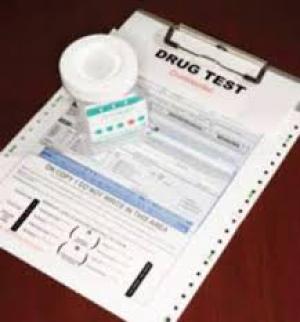With Trump and the Immigration and Customs Enforcement bureau casting a widened net, one way we can protect immigrants is through drug law reforms.
More ominous noises coming from the nation's chief law enforcement officer.
A package of implementation bills is moving in Arkansas, Florida Republicans use an implementation bill to try to impose restrictions on the voter-approved medical marijuana law, and more.
A New Jersey cop gets nailed for stealing drug dog training cocaine, a California cop get caught pilfering weed from a domestic violence call, a Kentucky cop heads for prison for stealing $30,000 worth of drugs, guns, and cash, and more.
Eleven senators urge the Trump administration to leave legal marijuana alone, a federal legalization bill gets introduced, Justin Trudeau says yes to marijuana legalization but no to drug decriminalization, the INCB rips the Philippines' bloody drug war, and more.
Legalization bills are getting hearings on the East Coast, decriminalization advances in New Mexico and Israel, a Wyoming edibles penalty bill is dead, and more.
Pennsylvania Auditor General Eugene DePasquale comes out for marijuana legalization, citing the tax revenue boost; a bill to limit home cultivation in Colorado advances, the Arizona Senate approves a hemp bill, the Arkansas Senate kills a no-smoking medical marijuana bill, and more.
Marijuana policy continues to play out in state legislatures across the land, asset forfeiture reform is moving in Iowa, the Ohio Supreme Court reverses itself on cocaine sentencing, and more.
Attorney General Sessions hints at a return to tough federal drug sentencing, Rhode Island Attorney General Kilmartin announces a campaign to fend off marijuana legalization, Bolivia's president signs a law nearly doubling legal coca cultivation, and more.
The Pentagon adds a bunch of opioids and new synthetics to the drug panel it uses to test new recruits, a Colorado bill to allow social marijuana consumption advances, Canada doesn't take kindly to Marc and Jodie Emery's latest efforts, and more.
This article was produced in collaboration with AlterNet and first appeared here.
As President Trump ratchets up the machinery of mass deportation, supporters of a humane, comprehensive approach to immigration are seeking ways to throw sand in its gears. When mass deportation is touted because of the "criminality" of those targeted, one solution is to reduce criminalization, which is not to turn a blind eye to violent or dangerous criminals, but to recognize that we live in an over-criminalized society. That means school kids can now be arrested for behavior that would have sent them to the principal's office in years past (especially if they're a certain color). The US also generates the world's largest prison-industrial complex, and has criminalized tens of millions of people for the offense of simply possessing a certain plant, and millions more for possessing other proscribed substances.

ICE arrests an immigrant in San Jose. (dhs.gov)
While Trump talks about "bad hombres" as he ramps up the immigration crackdown, data shows that the net of criminality used to deport not just undocumented workers, but also legal immigrants and permanent resident aliens, is cast exceedingly wide. It's overwhelmingly not gang members or drug lords who are getting deported, but people whose crimes include crossing the border without papers, as well as traffic and minor drug offenses.
The report Secure Communities and ICE Deportations: A Failed Program , which examined Immigration and Customs Enforcement deportation records, found that the top three "most serious" criminal charges used to deport people and which accounted for roughly half of all deportations were illegal entry, followed by DWI and unspecified traffic violations.
The fourth "most serious" criminal charge used to deport people was simple marijuana possession, with more than 6,000 people being thrown out of the country in fiscal years 2012 and 2013, the years the study covered. Right behind that was simple cocaine possession, accounting for another 6,000 in each of those years. "Other" drug possession charges accounted for nearly 2,500 deportations each of those years.
Nearly 3,000 people a year were deported for selling pot, and more than 4,000 for selling cocaine, but only about 2,000 a year for the more serious offense of drug trafficking, accounting for a mere 1% of all deportations in those years.

ICE raid in Atlanta. (dhs.gov)
This has been going on for years. In the same report, researchers estimated that some 250,000 people had been deported for drug offenses during the Obama administration, accounting for one-fifth of all criminal deportations. Now, the Trump administration gives every indication it intends to be even tougher.
In light of the massive use of drug charges to deport non-citizens, drug reform takes on a whole new aspect. Marijuana decriminalization and legalization may not generally be viewed through the lens of immigrant protection, but they shield millions of people from drug deportation in those states that have enacted such laws. Similarly, efforts to decriminalize drug possession in general are also moves that would protect immigrants.
Now, legislators and activists in vanguard states are adopting prophylactic measures, such as sealing marijuana arrest records, rejiggering the way drug possession cases are handled, and, more fundamentally, moving to decriminalize pot and/or drug possession. In doing so, they are building alliances with other communities, especially those of color, that have been hard hit by the mass criminalization of the war on drugs.
In California, first decriminalization in 2011 and then outright legalization last year removed pot possession from the realm of the criminal, offering protection to hundreds of thousands of immigrants. But the California legalization initiative, Proposition 64, also made the reduction or elimination of marijuana-related criminal penalties retroactive,meaning past convictions for marijuana offenses reduced or eliminated can be reclassified on a criminal record for free. Having old marijuana offenses reduced to infractions or dismissed outright can remove that criminal cause for removal from any California immigrant's record.
Across the county in New York, with a charge led by the state legislature's Black, Puerto Rican, Hispanic and Asian Caucus, the state assembly voted in January to approve AB 2142, which would seal the criminal records of people who had been unjustly arrested for simple possession of marijuana in public view, a charge police used to still bust people for marijuana after it was decriminalized in 1977. Like the Prop 64 provision in California, this measure would protect not only minority community members in general -- who make up 80% of those arrested on the public possession charge -- from the collateral consequences of a drug conviction, but immigrants in particular from being expelled from their homes.
"A marijuana conviction can lead to devastating consequences for immigrants, including detention and deportation," said Alisa Wellek, executive director of the Immigrant Defense Project. "This bill will provide some important protections for green card holders and undocumented New Yorkers targeted by Trump's aggressive deportation agenda."
"Sealing past illegitimate marijuana convictions is not only right, it is most urgent as the country moves toward legalization and immigrant families are put at risk under our new federal administration," said Kassandra Frederique, New York state director for the Drug Policy Alliance. "Comprehensive drug law reform must include legislative and programmatic measures that account for our wrongheaded policies and invest in building healthier and safer communities, from the Bronx to Buffalo, Muslim and Christian, US-born and green card-holding."
Companion legislation in the form of Senate Bill 3809 awaits action in the Senate, but activists are also pushing Gov. Andrew Cuomo to include similar language as part of his decriminalization proposal in state budget legislation, opening another possible path forward.

One-way street? (Creative Commons/Wikimedia)
"In New York State 22,000 people were arrested for marijuana possession in 2016. The misdemeanor charge for public view of marijuana possession gives those people convicted a criminal record that will follow them throughout their lives, potentially limiting their access to education, affecting their ability to obtain employment, leading to a potential inability to provide for their families," said Sen. Jamaal Bailey, author of the Senate bill.
"Furthermore, and even more problematic, there exist significant racial disparities in the manner that marijuana possession policy is enforced. Blacks and Latinos are arrested at higher rates despite the fact that white people use marijuana at higher rates than people of color. Responsible and fair policy is what we need here," Bailey added. "We must act now, with proactive legislation, for the future of many young men and women of our state are at stake here."
Meanwhile, back in California, Assemblywoman Susan Talamantes Eggman (D-Stockton) has reintroduced legislation explicitly designed to shield immigrants from deportation for drug possession charges, as long as they undergo treatment or counseling. Under her bill, Assembly Bill 208, people arrested for simple possession would be able to enroll in a drug treatment for six months to a year before formally entering a guilty plea, and if they successfully completed treatment, the courts would wipe the charges from their records.
The bill would address a discrepancy between state law and federal immigration law. Under state drug diversion programs, defendants are required to first plead guilty before opting for treatment. But although successful completion of treatment sees the charges dropped under state law, the charges still stand under federal law, triggering deportation proceedings even if the person has completed treatment and had charges dismissed.
"For those who want to get treatment and get their life right, we should see that with open arms, not see it as a way of deporting somebody," Eggman said.
Eggman authored a similar bill in 2015 that got all the way through the legislature only to be vetoed by Gov. Jerry Brown, who worried that it eliminated "the most powerful incentive to stay in treatment -- the knowledge that the judgment will be entered for failure to do so."
In the Trump era, the need for such measures has become even more critical, Eggman said.
"It might be a more complex discussion this year, and it's a discussion we should have," she said. "If our laws are meant to treat everyone the same, then why wouldn't we want that opportunity for treatment available to anyone without risk for deportation?"
Reforming drug laws to reduce criminalization benefits all of us, but in the time of Trump, reforming drug laws is also a means of protecting some of our most vulnerable residents from the knock in the night and expulsion from the country they call home.
back to top
This article was produced in collaboration with AlterNet and first appeared here.

dea pot raid DEA_2.jpg
On conservative radio talker Hugh Hewitt's
program Thursday, Attorney General Jeff Sessions continued to bad mouth marijuana and suggested he might use
laws enacted to go after the Mafia against the legal marijuana industry.
"I think it's a more dangerous drug than a lot of people realize. I don#39;t think we're going to be a better community if marijuana is sold in every corner grocery store," the attorney general told Hewitt.
The conservative talker then helpfully suggested that one way Washington could go after legal pot was by bringing racketeering charges against marijuana businesses.
"One RICO prosecution against one marijuana retailer in one state that has so-called legalization ends this façade and this flaunting of the Supremacy Clause. Will you be bringing such a case?" Hewitt asked Sessions.
Sessions didn't exactly jump on the idea, but neither did he reject it.
"We will um… marijuana is against federal law, and that applies in states where they may have repealed their own anti-marijuana laws," Sessions said in response. "So yes, we will enforce law in an appropriate way nationwide. It's not possible for the federal government, of course, to take over everything the local police used to do in a state that's legalized it."
But Hewitt was not done chewing on that bone, asking Sessions if he couldn't just make an example out of somebody.
"I mean, if you want to send that message, you can send it. Do you think you're going to send it?" he asked.
Sessions had to clue in Hewitt about the difficulty of reining in the burgeoning the legal marijuana industry.
"Well, we'll be evaluating how we want to handle that," he said. "I think it's a little more complicated than one RICO case, I've got to tell you. This, places like Colorado, it's just sprung up a lot of different independent entities that are moving marijuana. And it's also being moved interstate, not just in the home state," he added.
Sessions has been a staunch foe of marijuana legalization, and the industry has been on tenterhooks since he was nominated as the nation's highest law enforcement officer. He attempted to soft-shoe his views during his confirmation hearings, suggesting that he wasn't going to aggressively go after the legal pot industry, but his comments with Hewitt may suggest otherwise.
Taken together with a memo on violent crime Sessions sent to federal prosecutors Wednesday in which he hinted at at rolling back Obama Justice Department policies directing federal prosecutors to not always seek the most serious charges in drug cases and to avoid seeking mandatory minimum sentences, his comments to Hewitt Thursday suggest that the Trump administration is about to head resolutely backwards on drug policy in general and marijuana policy in particular.
Listen to the Hewitt interview below:
back to top
A package of implementation bills is moving in Arkansas, Florida Republicans use an implementation bill to try to impose restrictions on the voter-approved medical marijuana law, and more.
Arkansas
Last Thursday, Aa package of "fix" bills were moving. The Senate sent two medical marijuana bills to the governor's desk, while the House passed three more bills and sent them to the Senate. Winning final legislative approval were House Bill 1556, which bars the use of teleconferencing to certify a patient for medical marijuana, and House Bill 1402, which would allow the state to reschedule marijuana if the federal government does it first. Meanwhile, the Senate will now take up House Bill 1580, which imposes a 4% sales tax on cultivation facilities and a 4% sales tax on dispensary sales; House Bill 1436, which sets an expiration date for dispensary licenses, and House Bill 1584, which would led regulators issue temporary dispensary or cultivation licenses when the original owner ceases to be in control of the business.
On Monday, the Senate killed a bill to ban smoking medical marijuana. The Senate voted 15-10 to reject Senate Bill 357, which would have banned smoking medical marijuana. Bill sponsor Sen. Jason Rapert (R-Conway) argued smoking is a public health hazard and that smoking marijuana is a recreational use, not a medicinal one, but his colleagues were not buying his argument.
Florida
On Monday, GOP leaders filed an implementation bill that would ban smoking and edibles. Florida voters overwhelmingly approved a medical marijuana initiative in November, but now Rep. Ray Rodrigues (R-Fort Myers) has filed a medical marijuana regulation bill that would ban people from smoking it or using it in edible form. The measure, House Bill 1397, is not yet available on the legislative website. Rodrigues is a member of the Republican House leadership, and the bill represents the Republican approach to expanding medical marijuana access in the state. "It goes further than the current statute in terms of restricting medical marijuana," says Ben Pollara, the medical marijuana initiative's campaign director "There was unanimous agreement that the new amendment would expand use."
Mississippi
Last Thursday, a bill to let pharmacies dispense CBD cannabis oil went to the governor's desk. The House Thursday approved Senate Bill 2610, which would amend the state's existing CBD cannabis oil law to allow pharmacies to join the University of Mississippi Medical Center in dispensing the medicine. The bill has already passed the Senate and now heads to the desk of Gov. Phil Bryant (R).
Utah
On Wednesday, Ulawmakers passed a medical marijuans study bill, but advocates call it a Trojan horse. The House voted to concur with earlier Senate amendments to House Bill 130 and sent it to the desk of Gov. Gary Herbert (R). The bill allows state universities to study cannabinoid products for their medicinal potential, but doesn't allow for any actual use. Medical marijuana advocates called the bill "a Trojan horse," saying it is merely a delaying tactic.
West Virginia
On Monday, a medical marijuana bill was filed. Sen. Patricia Rucker (R-Jefferson) and 11 cosponsors have filed Senate Bill 386 and companion legislation in the House that would allow for the medical use of marijuana by patients with one of a list of qualifying disorders.
Wisconsin
On Tuesday, the legislature passed a CBD cannabis oil bill. The Assembly voted to approve Senate Bill 10, which would allow for the use of CBD cannabis oil by children suffering seizures. The bill now goes to the desk of Gov. Scott Walker (R), who is expected to sign it.
[For extensive information about the medical marijuana debate, presented in a neutral format, visit MedicalMarijuana.ProCon.org.]
back to top
A New Jersey cop gets nailed for stealing drug dog training cocaine, a California cop get caught pilfering weed from a domestic violence call, a Kentucky cop heads for prison for stealing $30,000 worth of drugs, guns, and cash, and more. Let's get to it:
In Tom's River, New Jersey,
an Ocean County sheriff's lieutenant was arrested last Wednesday for stealing cocaine from the department's canine training unit. Lt. John Adams is accused of stealing the cocaine for his personal use over a two-year period. The cocaine was stored at the sheriff's office for use in the drug dog training program. Adams is charged with theft, cocaine possession, and official misconduct.
In Tucker, Georgia, a DeKalb County police officer was arrested Monday on charges he stole cash from an apartment during a drug investigation. Officer Ajamia Guyton was investigating a forced entry call that became a drug investigation when narcotics were discovered at the residence. Detectives left Guyton in charge of the scene while they went to obtain a drug search warrant, but found the money missing when they returned. Guyton is charged with theft by taking, tampering with evidence and violation of oath of office.
In San Jose, California, a San Jose police officer was arrested Monday for allegedly stealing marijuana while answering a domestic violence call. Officer Julio Morales, a 21-year veteran, was arrested on suspicion of petty theft and released. He had been on paid leave since February, after an internal investigation found he had stolen the weed.
In Lebanon, Ohio, a former state prison guard was sentenced last Friday to a year in prison for smuggling illegal drugs into the Lebanon Correctional Institution last August. Walter Richardson, 23, got caught with 100 suboxone strips stuffed in the finger of a rubber glove in his pocket when he came to work. He copped to illegal conveyance of drugs into a detention facility and possession of drugs.
In Boulder, Colorado, a sheriff's deputy was sentenced last Friday to 18 months' probation for plotting to smuggle chewing tobacco and marijuana edibles into the Boulder County Jail. Tyler Paul Mason, 33, pleaded guilty to a misdemeanor count of official misconduct in exchange for prosecutors dropping two felony counts of conspiracy to introduce contraband. Mason went down after an inmate told staff another inmate had made arrangements with Mason to get the contraband. Investigators then had a woman acting as a confidential informant met with Mason and give him money for his services.
In Simpsonville, Kentucky, a former Simpsonville police officer was sentenced Monday to 12 years in prison for stealing $30,000 in cash, drugs, and handguns from department evidence lockers. Terry Putnam had pleaded guilty to multiple charges, including theft and official misconduct, in January.
back to top
Eleven senators urge the Trump administration to leave legal marijuana alone, a federal legalization bill gets introduced, Justin Trudeau says yes to marijuana legalization but no to drug decriminalization, the INCB rips the Philippines' bloody drug war, and more.
Marijuana PolicyEleven US Senators Urge Trump Administration Not to Mess With Legal Marijuana. Eleven senators, led by Lisa Murkowski (R-AL) and Elizabeth Warren (D-MA) sent a letter to Attorney General Jeff Sessions Thursday urging him to uphold the Obama administration policy of letting states implement their own marijuana laws. "We respectfully request that you uphold DOJ's existing policy regarding states that have implemented strong and effective regulations for recreational use," they wrote. "It is critical that states continue to implement these laws."
Republican Congressman Files Federal Marijuana Legalization Bill. Freshman Virginia Republican Rep. Thomas Garrett has filed a legalization bill, House Resolution 1227, that is identical to the one filed last year by Sen. Bernie Sanders (I-VT). Unlike the Sanders bill, which garnered no cosponsors, this one already has three. Garrett played up the states' rights angle in announcing the bill: "Virginia is more than capable of handling its own marijuana policy, as are states such as Colorado or California," he said.
New Mexico Senate Passes Bill Lowering Marijuana Penalties. The Senate Thursday approved Senate Bill 258, which would make possession of less than a half ounce an administrative offense punishable by no more than a $50 fine. Possession of between a half ounce and an ounce would be a misdemeanor, punishable by no more than a $100 fine. The bill now goes to the House.
Medical Marijuana
Mississippi Bill to Let Pharmacies Dispense CBD Cannabis Oil Goes to Governor. The House Thursday approved Senate Bill 2610, which would amend the state's existing CBD cannabis oil law to allow pharmacies to join the University of Mississippi Medical Center in dispensing the medicine. The bill has already passed the Senate and now heads to the desk of Gov. Phil Bryant (R).
Heroin and Prescription Opioids
Maryland Governor Declares Opioid State of Emergency. Gov. Larry Hogan (R) announced Wednesday that he is declaring a state of emergency around the state's heroin and opioid abuse problem. "I will be signing an executive order declaring a state of emergency in response to rapid escalation of the heroin and opioid crisis in our state," Hogan said. "With this continuing threat increasing at such an alarming rate, we must allow for rapid coordination with our state and local emergency teams." Hogan said issuing the emergency notice would give the state and local emergency agencies more flexibility to deal with the problem.
Asset Forfeiture
Idaho House Passes Civil Asset Forfeiture Reform Bill. The Republican-controlled House voted overwhelmingly Thursday to approve House Bill 202, which would bar police from seizing cash or property merely because it was in close proximity to an illegal substance. The bill also bans seizing vehicles unless they are connected to drug-dealing offenses, requires judicial approval for police to keep assets, and requires police to report on seizures. The bill passed despite opposition from the Idaho Sheriffs' Association. It now goes to the Senate.
International
US to Pressure Colombia to Cut Coca Crop. American drug officials will go to Bogota next week to "engage in serious discussions with the Government of Colombia" about the sharp increase in coca cultivation and cocaine production in the country in recent years, they said in a press briefing on Thursday. Colombia has seen a spike in coca cultivation in 2014 and 2015, the last years for which data is available. "We are working on the problem. It is a serious problem," said William R. Brownfield, assistant secretary of the US Bureau of International Narcotics and Law Enforcement Affairs, during Thursday's press briefing. "Both governments recognize this fact. Both governments realize that it is neither in the interest of Colombia, nor in the United States of America, nor, frankly, any country in the Western Hemisphere or the world, that there be more than a doubling of cocaine production coming from Colombia over the last four -- three or four years."
Justin Trudeau Says Marijuana Legalization Coming, But Rejects Drug Decriminalization for Canada. The Canadian prime minister said Thursday he hoped to have a marijuana legalization bill before parliament this summer, but rejected calls from British Columbia public health officials to decriminalize drug possession in a bid to reduce overdose deaths. "I have a tremendous amount of respect for anyone who is on the front lines," he said. "I always listen very carefully to what they have to say. But at the same time, I can absolutely confirm that we are moving forward on a framework to regulate and control marijuana to protect our kids and keep our communities safer from organized crime, and we are not planning on including any other illicit substances in the movement toward legalizing, controlling and regulating."
International Narcotics Control Board Rips Philippines Drug War. In its annual report, released Thursday, the INCB said President Rodrigo Duterte's bloody war on drug users and sellers violates international drug control treaties. "The Board wishes to bring once again to the attention of all Governments that extrajudicial action, purportedly taken in pursuit of drug control objectives, is fundamentally contrary to the provisions and objectives of the three international drug control conventions, under which all actions must be undertaken within the due process of law,"the report said. The INCB said that it had issued a statement calling on the Philippines government to issue an immediate and unequivocal condemnation and denunciation of the killings of individuals suspected of involvement in the illegal drug trade. It also called on the government to put an immediate stop to such actions and bring the perpetrators of such acts to justice.
back to top
Legalization bills are getting hearings on the East Coast, decriminalization advances in New Mexico and Israel, a Wyoming edibles penalty bill is dead, and more.
Marijuana PolicyConnecticut Legalization Bill Gets Hearing Tomorrow. The General Assembly's Public Health Committee has a hearing set for House Bill 5314, cosponsored by Rep. Melissa Ziobron (R-East Haddam). The bill would legalize marijuana for people 21 and over, set up a regulatory system for marijuana cultivation and sales, and set up a tax system for marijuana commerce. Other legalization bills proposed by Democrats are awaiting action.
Maryland Legalization Bills Get Hearing. Supporters and foes of marijuana legalization testified before the Senate Judicial Proceedings Committee last Thursday on Senate Bill 927, which would tax and regulate legal marijuana sales, and on Senate Bill 891, which would set up a referendum to amend the state constitution to allow people 21 and over to possess up to two ounces and grow up to six plants. No votes were taken.
New Mexico Senate Approves Decriminalization Bill. The Senate voted last Thursday to approve Senate Bill 258, which would decriminalize the possession of up to a half-ounce of marijuana. Between a half-ounce and eight ounces would remain a misdemeanor. The move comes after the legislature rejected outright legalization. The bill is now before the House Consumer and Public Affairs Committee.
North Dakota Legalization Initiative Supporters Will Try Again. Initiative campaigners gave up a few months ago on signature gathering, but now say they will try again and are aiming at getting a measure on the 2018 ballot. Campaigners said they would have a new petition later this spring or summer.
Wyoming Bill to Set Edibles Penalties Dies Amidst Discord. A conference committee of House and Senate members was unable to reach agreement on how to punish the possession of marijuana edibles, killing House Bill 197. The bill had sought to close a loophole in state law that left it unclear how to punish edibles possession, but originally also included sentencing reductions for marijuana in its plant form. That provision was intended to make the bill palatable to Democratic lawmakers, but it was stripped out of the bill in the Senate. The bill died when the House rejected the Senate version.
Medical Marijuana
Arkansas Medical Marijuana "Fix" Bills Are Moving. The Senate sent two medical marijuana bills to the governor's desk last Thursday, while the House passed three more bills and sent them to the Senate. Winning final legislative approval were House Bill 1556, which bars the use of teleconferencing to certify a patient for medical marijuana, and House Bill 1402, which would allow the state to reschedule marijuana if the federal government does it first. Meanwhile, the Senate will now take up House Bill 1580, which imposes a 4% sales tax on cultivation facilities and a 4% sales tax on dispensary sales; House Bill 1436, which sets an expiration date for dispensary licenses, and House Bill 1584, which would led regulators issue temporary dispensary or cultivation licenses when the original owner ceases to be in control of the business.
West Virginia Medical Marijuana Bills Filed. Sen. Patricia Rucker (R-Jefferson) and 11 cosponsors have filed Senate Bill 386 and companion legislation in the House that would allow for the medical use of marijuana by patients with one of a list of qualifying disorders.
Asset Forfeiture
Mississippi Senate Approves Asset Forfeiture Reform Bill. The Senate voted unanimously last Thursday to approve House Bill 812, which will require law enforcement to report on all forfeitures and creates a new asset forfeiture warrant system under which a judge would have to authorize seizures. The bill had already passed both houses, but had to go back to the Senate for a housekeeping vote. It now head to the desk of Gov. Phil Bryant (R).
International
Israeli Cabinet Approves Marijuana Decriminalization. The cabinet has approved the public safety minister's proposal to decriminalize pot possession. Under the proposal, people caught with marijuana would face only administrative fines for their first three offenses, but criminal charges for a fourth. The measure must still be approved by the Knesset.
Durham Police Will Become First in England to Implement Prescription Heroin and Supervised Injection Sites. Police in Durham are set to begin buying pharmaceutical heroin and providing it to addicts, who will inject it twice a day at a supervised injection site. The plan is currently being studied by public health authorities in the region.
back to top
Pennsylvania Auditor General Eugene DePasquale comes out for marijuana legalization, citing the tax revenue boost; a bill to limit home cultivation in Colorado advances, the Arizona Senate approves a hemp bill, the Arkansas Senate kills a no-smoking medical marijuana bill, and more.

Pennsylvania's auditor general has reefer dollar signs in his eyes as he calls for legalization. (Creative Commons/Wikimedia)
Colorado Bill to Limit Home Cultivation Advances. The House Finance Committee voted Monday to approve House Bill 1220, which would limit home grows to 12 plants. Bill sponsors paint it as an effort to prevent diversion to the illegal market, but medical marijuana patients and advocates testified that it could make it difficult for them to grow enough medicine for their needs.
Nevada Bill to Allow Licenses for Public Events With Pot Consumption Filed. The state's leading pro-marijuana reform politician, Sen. Tick Segerblom (D-Las Vegas) filed Senate Bill 236 Monday. The bill, which is not yet available on the legislative website, would allow local governments to issue licenses for one-off events with public pot consumption, as well as licensing pot shops, bars, or other businesses to allow consumption on-premises. The bill has been referred to the Senate Judiciary Committee.
Pennsylvania Auditor Endorses Marijuana Legalization, Says State Could Earn Millions. Auditor General Eugene DePasquale (D) said Monday he supported marijuana legalization and that the state could generate $200 million a year in tax revenues from it. "The regulation-and-taxation-of-marijuana train has rumbled out of the station across the United States," DePasquale said at a press conference in the state capitol. "The question is whether Pennsylvania is going to miss its stop."
Medical Marijuana
Arkansas Senate Kills Bill to Ban Smoking of Medical Marijuana. The Senate voted 15-10 Monday to reject Senate Bill 357, which would have banned smoking medical marijuana. Bill sponsor Sen. Jason Rapert (R-Conway) argued smoking is a public health hazard and that smoking marijuana is a recreational use, not a medicinal one, but his colleagues were not buying his argument.
Hemp
Arizona Senate Passes Hemp Legalization Bill. The Senate has approved Senate Bill 1337, which would authorize industrial hemp production, processing, manufacture, distribution, and sales. It also includes language saying the state cannot prevent hemp commerce merely on the grounds that it is federally illegal.
Drug Policy
West Virginia Bill Would Create Drug Policy Office, Track Overdoses. A bill that would create an office to track fatal drug overdoses passed the House last week and heads to the Senate. House Bill 2620 would provide a central data collection point to track overdoses and arrests in the state. That information could be compiled and used as supporting data in research and as the state applies for federal grant money to combat the state's drug abuse epidemic. The bill is only one of many filed to deal with the opioid problem in the state. Click on the link for more.
back to top
Marijuana policy continues to play out in state legislatures across the land, asset forfeiture reform is moving in Iowa, the Ohio Supreme Court reverses itself on cocaine sentencing, and more.

The bud is keeping state legislatures busy. (Flickr)
Alaska Cannabis Cafes Are Back Under Consideration. The Marijuana Control Board met Tuesday afternoon in Anchorage and agreed to try again to come up with rules for on-site marijuana consumption at businesses. The notion was shot down at the last board meeting, but revived on a 4-1 vote.
Connecticut Legalization Bills Get Hearing. Lawmakers went into the evening hours Tuesday as they engaged in heated debate over several bills before the General Assembly that would legalize marijuana. Click the link to get the flavor of the dewbate.
New Hampshire House of Representatives Overwhelmingly Approves Bill to Decriminalize Marijuana Possession. The House voted 318-36 Wednesday to approve House Bill 640, which would decriminalize the possession of up to an ounce of marijuana. Similar bills have failed in years past, but opposition seems to have largely evaporated this year. The measure now heads to the Senate.
Los Angeles Voters Approved Marijuana Regulation Initiative. Voters in Los Angeles approved Measure M with nearly 80% voting in favor. The measure would allow the city to regulate legal marijuana businesses when the legal recreational commerce comes on line next year.
Medical Marijuana
Florida Bill Would Ban Smoking and Edibles. Florida voters overwhelmingly approved a medical marijuana initiative in November, but now Rep. Ray Rodrigues (R-Fort Myers) has filed a medical marijuana regulation bill that would ban people from smoking it or using it in edible form. The measure, House Bill 1397, is not yet available on the legislative website. Rodrigues is a member of the Republican House leadership, and the bill represents the Republican approach to expanding medical marijuana access in the state. "It goes further than the current statute in terms of restricting medical marijuana," says Ben Pollara, the medical marijuana initiative's campaign director. "There was unanimous agreement that the new amendment would expand use."
Utah Lawmakers Pass Medical Marijuana Study Bill; Advocates Call it a Trojan Horse. The House voted Wednesday to concur with earlier Senate amendments to House Bill 130 and sent it to the desk of Gov. Gary Herbert (R). The bill allows state universities to study cannabinoid products for their medicinal potential, but doesn't allow for any actual use. Medical marijuana advocates called the bill "a Trojan horse," saying it is merely a delaying tactic.
Wisconsin Legislature Passes CBD Bill. The Assembly voted Tuesday night to approve Senate Bill 10, which would allow for the use of CBD cannabis oil by children suffering seizures. The bill now goes to the desk of Gov. Scott Walker (R), who is expected to sign it.
Asset Forfeiture
Iowa Senate Committee Passes Bill Taking on Asset Forfeiture; Closes Federal Loophole. The Senate Judiciary Committee voted Monday to approve Senate File 446, which would severely limit asset forfeiture without a criminal conviction and which would bar prosecutors from doing an end run around state law by passing cases off to the feds. The bill now heads for a Senate floor vote.
Sentencing
Ohio Supreme Court Reverses Itself, Declares Filler Must Be Included in Drug Weights. Two months after ruling that prosecutors must prove the actual amount of pure cocaine possessed -- not inert filler -- to secure longer sentences, the state Supreme Court has done a U-turn. In a ruling Monday, the court sided with prosecutors and held that the total weight of drug plus filler must be used when determining sentences. The reversal comes after two new judges were named to the court earlier this year, and dissenting Justice Bill O'Neill said that was the only thing that changed. "The logic is unassailable. The possession of baby formula, talcum powder, or baking soda does not pose the same risk to the public's health and safety as possession of cocaine does," O'Neill wrote.
back to top
Attorney General Sessions hints at a return to tough federal drug sentencing, Rhode Island Attorney General Kilmartin announces a campaign to fend off marijuana legalization, Bolivia's president signs a law nearly doubling legal coca cultivation, and more.

It looks like the new attorney general is going old school with harsher drug sentencing. (senate.gov)
Florida Decriminalization Bills Filed. A pair of Democratic lawmakers has filed identical decriminalization bills in the House and Senate. State Rep Carlos Guillermo Smith (D-Orlando) filed House Bill 1403, while state Sen. Jeff Clemens (D-Lake Worth) filed Senate Bill 1662. The bills would make possession of up to an ounce a civil violation punishable by a fine of no more than $100. Under current Florida law, small time marijuana possession is a misdemeanor punishable by up to a year in jail and a $1,000 fine.
Rhode Island Attorney General Gins Up Anti-Legalization Campaign. State Attorney General Peter Kilmartin (D) launched a campaign against marijuana legalization Thursday. Kilmartin said he was mobilizing lawmakers, business leaders, and others concerned about public health and public safety issues to fight ongoing efforts in the legislature to legalize it. He's joining forces with Smart Approaches to Marijuana, among others.
Heroin and Prescription Opioids
Florida Bills Would Have Dealers Facing Manslaughter Charges for Opioid Overdose Deaths. A pair of Republican state lawmakers has filed identical bills that would allow prosecutors to bring manslaughter charges against people who sold opioids to people who overdosed and died on them. Sen. Gregg Steube (R-Sarasota) filed Senate Bill 150 Tuesday, while Rep. Jim Boyd (R-Bradenton) filed House Bill 477.
Drug Policy
Attorney General Sessions Signals He Could Reverse Obama Policy of Seeking Less Serious Charges in Drug Cases. Sessions sent a memo to federal prosecutors Wednesday calling on them to crack down on violent crime, and in that memo, he hinted at rolling back Obama administration policies directing federal prosecutors to not always seek the most serious charges in drug cases and to avoid seeking mandatory minimum sentences by leaving drug quantities out of charging documents. "I encourage you to employ the full complement of federal law to address the problem of violent crime in your district," Sessions wrote. "Further guidance and support in executing this priority -- including an updated memo on charging for all criminal cases -- will be forthcoming."
International
Bolivian President Signs Law Nearly Doubling Amount of Legal Coca Grown. President Evo Morales, a former coca grower himself, signed into law Wednesday a bill that will increase the amount of coca that can be legally planted from 30,000 acres to 55,000 acres. "We want to guarantee coca supplies for life," he said.
back to top
The Pentagon adds a bunch of opioids and new synthetics to the drug panel it uses to test new recruits, a Colorado bill to allow social marijuana consumption advances, Canada doesn't take kindly to Marc and Jodie Emery's latest efforts, and more.

DOD is expanding the panel of drugs for which it tests new recruits. (Wikimedia)
Colorado Senate Approves Bill to Allow Marijuana Social Clubs. The state Senate on Thursday voted to approve Senate Bill 184, which would allow local governments to permit BYOB cannabis clubs, as long as the businesses seeking them do not serve alcohol or food beyond light snacks. The bill doesn't specify whether indoor smoking would be allowed, which means a private club with no more than three employees could allow it under state smoking laws. The bill now goes to the House.
Medical Marijuana
West Virginia House Kills Surprise Bid to Reschedule Marijuana. Seeing that medical marijuana legislation was going nowhere in Charleston, Delegate Shawn Fluharty (D-Ohio) attempted to inset an amendment into a routine drug scheduling bill that would have moved marijuana from Schedule I to Schedule IV. The amendment excited several hours of debate, but was ultimately killed on a 35-64 vote. "Why are we so scared of helping people?" Fluharty argued in closing floor debate. "That's exactly what this does."
Asset Forfeiture
New Hampshire House Passes Bill to Close Federal Asset Forfeiture Loophole. The state House voted Thursday to approve House Bill 614, which would bar state law enforcement agencies or prosecutors from agreeing to transfer seized property to the federal government unless that seized property includes more than $100,000 in cash. That would end the loophole through which cops and prosecutors seek to end-run a 2016 law that barred civil forfeiture in most cases. The bill now heads to the Senate.
Drug Testing
Pentagon Announces Expanded Drug Testing of New Recruits. The Defense Department is expanding the drug testing of new recruits to include the same 26-drug panel used for active military members. The change will be effective April 3. Currently, recruits are only tested for four substances -- marijuana, cocaine, amphetamines, and MDMA -- but the new drug test will also look for heroin, codeine, morphine, hydrocodone, oxycodone, hydromorphone, oxymorphone, and a number of synthetic cannabinoids and benzodiazepine sedatives.
International
Canadian Cops Raid Marc and Jodie Emery's Cannabis Culture Stores. Police on Thursday morning raided Cannabis Culture stores in Ottawa, Toronto, and Vancouver, as owners Marc and Jodie Emery awaited bail hearings in Toronto. The well-known marijuana reform couple were arrested Wednesday night at the Toronto airport on their way to a cannabis expo in Spain. Police raided seven Cannabis Culture stores and two residences, Toronto police said. The Emerys have been selling marijuana at the shops without waiting for Canada to actually get around to legalizing it.
Filipino Lawmakers Approve Medical Marijuana. The Philippines House on Wednesday approved a bill to allow for the use of marijuana for medicinal purposes. The move comes as the government of President Rodrigo Duterte wages bloody war on other drug users and sellers. The legislation approved by the House would create a government-issued ID card for patients and designates certain qualifying diseases and conditions, as well as allowing for caregivers and dispensaries.
back to top










